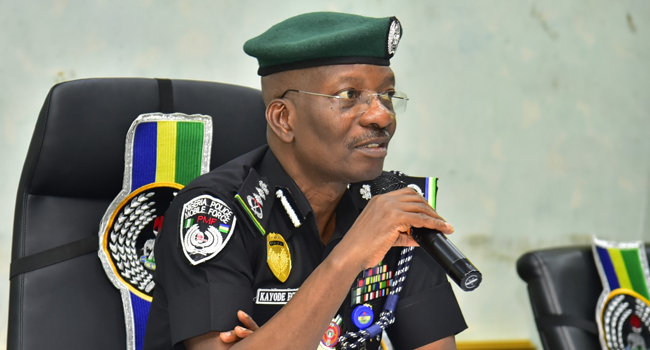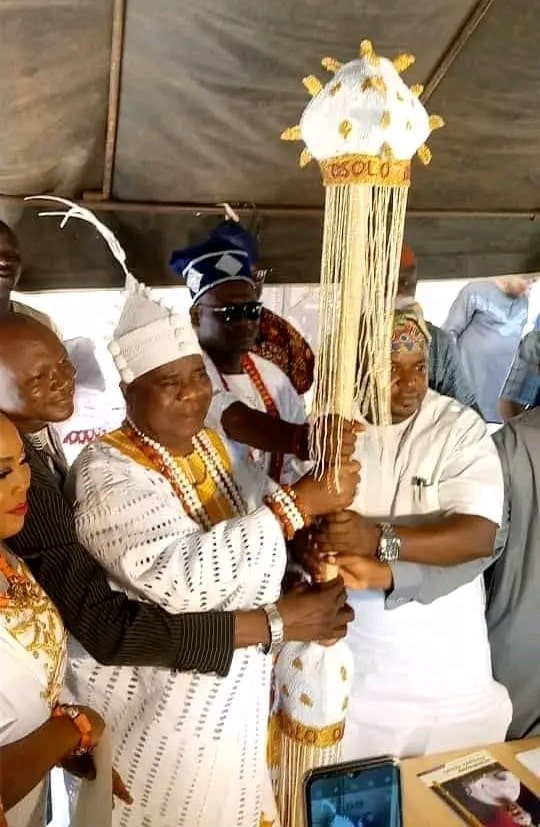INAUGURATION OF THE PRESIDENTIAL COMMITTEE ON THE IMPACT AND READINESS ASSESSMENT FOR THE AGREEMENT ESTABLISHING THE AFRICAN CONTINENTAL FREE TRADE AREA (AfCFTA) THE PRESIDENCY, ABUJA, MONDAY, 22ND OCTOBER 2018

INTRODUCTORY REMARKS BY DR. OKECHUKWU E. ENELAMAH, HONOURABLE MINISTER FOR INDUSTRY, TRADE AND INVESTMENT
Your Excellency, Mr. President ,

Your Excellency, Mr. Vice President,
Secretary to the Government of the Federation,
Chief of Staff to Mr. President,
Honourable Ministers,
Heads of MDAs, Paramilitary Organisation and Senior Government Officials,
Representatives and our Invited Guests, from the Private Sector and Civil Society,
Distinguished Ladies and Gentlemen.
On behalf of His Excellency, the President, I have the honour to welcome you all to this inauguration of the“Presidential Committee on the Impact and Readiness Assessment of the Agreement Establishing the African Continental Free Trade Area” (AfCFTA).
- The idea of an integrated African market to industrialize Africa, spur growth, enhance welfare and, create jobs, has been around for a long time. However, with the actual emergence of the AfCFTA in 2018, the decision was taken by the Government to mobilize stakeholders in the Nigerian economy to understand its details, interpret its opportunities and, re-organize our economic system for coherence and coordination, if the opportunities of the AfCFTA are to be realized and maximized. This is why Stakeholders, in the recently concluded 7-month nation-wide sensitization and consultation exercise, expressed their gratitude, unanimously, to H.E. Mr. President for democratizing the process of awareness building, information-sharing and receiving advice on how best to approach the AfCFTA.
- As background, in my introductory remarks, I will report, briefly,on 4 key points:
first, the technical state-of-play in the AfCFTA and associated developments in ECOWAS;
second, the Nation-Wide AfCFTA Stakeholder Sensitization and Consultative process;
third, domestic technical preparations, pending a final decision on the AfCFTA; and,
finally, the Terms of Reference (TORs) for this Presidential Committee.
- AfCFTA Technical State-of-Play and Associated Developments in ECOWAS
- The Agreement Establishing the African Continental Free Trade Area (AfCFTA) was signed in Kigali, Rwanda, at the 10thExtraordinary Summit of the African Union (AU), on 21stMarch 2018. So far, there are 49 Signatories and 7 Ratifications. There is a drive by the African Union (AU), in partnership with the United Nations Economic Commission for Africa (UN-ECA), to sensitize stakeholders on AfCFTA. Twenty-two ratifications are required for the AfCFTA to come into force. To this end, in Lagos, on 2nd and 3rd November, the African Union Commission (AUC), the United Nations Economic Commission for Africa (UN-ECA) and the Rockefeller Foundation, in collaboration with private and public sector stakeholders in Nigeria are organising the “Africa Trade Forum” (ATF), as a major stakeholder engagement and sensitization FORUM. The Forum will focus on how the implementation of the AfCFTA can be positioned to provide a platform for addressing Africa’s development challenges to industrialize, grow African economies, create jobs and reduce, if not eradicate poverty completely.
- In ECOWAS, Nigeria is the current Chairman. Thirteen (13) of the fifteen (15) Members are Signatories to the AfCFTA. The ECOWAS Commission (that is the Executive Secretariat) is moving ahead with ECOWAS Members to prepare the AfCFTA Market Access Offer for Trade in Goods; and, a Market Access Offer for Trade in Services. Because ECOWAS is a Customs Union (CU), these offers shall be deemed binding on all ECOWAS Members. The ECOWAS Market Access Offer shall be submitted to the AfCFTA process at the 13thMeeting of the Negotiating Forum in Addis in November.
- II. Nation-Wide AfCFTA Stakeholder Sensitization and Consultative Process
- AfCFTA Stakeholder Sensitization and Consultations were undertaken from March to October 2018. In the exercise, approximately:
34 groups and associations were sensitized and consulted;
approximately 3,017 natural persons were engaged in the various sessions and meetings;
5 Communiques were adopted and signed; in 5 geopolitical zones; and in the case of the South West Geopolitical Zone summary was issued in Lagos.
- 12 private sector groups submitted inputs, conveying their group positions on the AfCFTA in response to the nation-wide call for inputs on allmedia platforms.
- Substantively, the sensitization saw diverse emerged in the exercise. Some, however, while many stakeholders support AfCFTA, there some important stakeholders who are concerned about the impact of the AfCFTA.
- Those stakeholders in support, point to the market opportunities for growth for Nigerian exporters of goods and services; scope for industrialization through economies of scale in a single market; the mechanism for resolving trade disputes; cooperative mechanisms for regulating and promoting intra-African trade; and, the AfCFTA as a platform for Nigeria’s continued leadership in Africa as Africa remains the centrepiece of Nigeria’s foreign policy.
- Stakeholders who support the AfCFTAwere specific in pointing to policy sectors where complementary action is required by the Federal Government, as Nigeria prepares for the AfCFTA. These specific areas requiring intervention and complementing action include:
predictable, cost effective power supply. The cost of energy accounted for the major cost of doing business in Nigeria.
reducing the cost of money (interest rates) and expanding trade finance/micro-credits and finance for MSMEs;
fostering an Enabling Environment for Business that eliminates:
o multiple taxation by government and highway tolls;
o internal checkpoints; and,
o reduces the level of insecurity;
investing in trade Infrastructure (seaports, inland dry ports, road and railway networks);
re-opening historic Trade Corridors in the North East, South-South and South West for trade and investment facilitation;
mainstreaming informal unrecorded trade into the formal economyand developing a programme for Micro- Small and Medium Enterprises;
addressing the long-standing problem of trans-shipment and dumping, piracy, smuggling and other injurious trade practices by non-African trading partners, operating through Nigeria’s neighbours in complicity with individual Nigerians;
empowering women in international trade; and,
establishing a coordinating, implementation and monitoring body for Trade Policy, that would cover the AfCFTA, the Commonwealth and the WTO.
- While the stakeholder engagement was constructive, going forward, strategic trade stakeholder engagement shall notbe one-off. The stakeholder engagements, as undertaken for the AfCFTA, shall be sustained as regular work. Thank you to all who supported the stakeholder engagement. Reward for work is more work.
III. Domestic Technical Preparations for the AfCFTA
- Since the month of June, the Trade Team has been working hard on the technical preparations that would be needed for the emerging AfCFTA environment. A number of specific outputs are notable.
“Trade Remedy Mechanism for the Rules-based Safeguard of the Nigerian Economy”: A Trade Remedy Mechanism for safeguarding the Nigerian Economy has been carefully designed, in coordination the Office of the Chief of Staff to Mr. President; Office of HEVP; the EMT, and, NOTN.
Implementation of Rules of Origin: A plan, ready for implementation on Rules of Origin, has been designed.
ECOWAS Trade Reform Agenda: An ECOWAS Trade Reform Agenda, as a basis for Mr. President’s Chairmanship of ECOWAS, has been prepared, following an internal Government retreat on 16th August.
Updated Market Access Offer for Trade in Goods: An updated Market Access Goods Offer with a Draft Schedule of Tariff Concessions that provides a basis for re-negotiating the ECOWAS CET and AfCFTA Negotiations have been prepared. This exercise was carried out over a 4-month process with relevant stakeholders in a coordinated parallel process managed by the Tariff Technical Committee in the Federal Ministry of Finance and the Nigerian Office for Trade Negotiations of the Federal Ministry of Industry, Trade and Investment.
Updated Market Access Offer for Trade in Services: Similarly, an updated Market Access Services Offer with a Draft Schedule of Specific Commitments for Trade in Services have been prepared. This exercise was carried out in a consultative process within the Nigerian Coalition of Services Industries (NCSI). This process was co-chaired by the Chairman of the Section on Business Law of the Nigerian Bar Section (Mr. Seni Adio, SAN) – and Mrs. Irene Robinson-Ayanwale, Director, Legal Department, Nigerian Stock Exchange.
Productivity and competitiveness are being addressed and are on-going, in a number of areas, particularly:
o The Presidential Enabling Business Environment Council (PEBEC);
o the 49 plus initiatives in the “Industrial Policy and Competitiveness Advisory Council”, chaired by HEVP;
o the Power Sector Recovery Plan (PSRP);
o the Road Trust Fund; and,
o The Presidential Committee on Food Security.
- Positively, global institutions are continuing to recognise the work of government, in partnership with the private sector, to improve Nigeria’s trade and economic infrastructure. Last, Nigeria was moved up by ten places in the most recent Global Competitiveness 4.0, 2018 Report of the World Economic Forum (WEF). Although we have lot more work to do, the verdict made clear that the country is moving in the right direction on competitiveness with regard to the variables measured across institutions, policies, and factors that determine the level of productively of a nation. Productivity and competitiveness matters are work in progress. We have to stay committed to improving productivity and competitiveness for the long term.
- 21stCentury Trade Policy for Nigeria: An updated trade policy is being prepared. The draft shall be ready for review by the end of 2018. Nigeria’s last trade policy was in 2002. The global economy has since changed, significantly. Current evidence indicates that the 21st Century is being driven by the digital economy, trade in services, innovation-based intellectual property and micro small and medium enterprises.
- Terms of Reference of the AfCFTA Impact and Readiness
Assessment Committee
- Finally, following consultations, the Terms of Reference for the Presidential Committee on AfCFTA Impact Assessment and Readiness are to:
- i) assess the potential costs and impact of the AfCFTA for Nigeria in relation to the benefits;
- ii) identify the short, medium and long-term measures to prepare Nigerian businesses for the take-off of the AfCFTA trading bloc and a back-up plan that covers selected scenarios; and,
iii) review the trade remedy options to safeguard the Nigerian economy from predatory and other unfair trade practices
- More specifically, the scope of impact assessment would include, inter alia, the potential impact on government revenue (for weighted and non-trade weighted revenue), coherence between fiscal policy, structural and monetary policies. The assessment would also include impact on Nigerian businesses, domestically and regionally, for both trade in goods and trade in services.
- The assessment will review smuggling trends, including the potential escalation of smuggling and abuse of the rules of origin and address specific questions such as how AfCFTA provisions interact with legacy bilateral/multilateral trade agreements.
- Also to be considered is the national security implications of AfCFTA especially with the movement of persons.
- In assessing Nigeria’s readiness for AfCFTA, the Committee shall evaluate specific measures to prepare Nigerian businesses for export trade, taking into consideration, ongoing programs and reforms.
- The measures shall include critical trade enhancing projects, policies, laws, regulatory reforms and compliance actions to be implemented over the next 5- 10 years. The measures would include non-tariff and other non-technical barriers and transitional arrangements that if not addressed, will impede export of Nigerian Goods and Services and erode the expected benefits from AfCFTA.
- The Presidential Committee will also explore actions to improve and enforce the provisions of ECOWAS and other trade treaties with a view to assessing practical and policy-relevant aspects of implementing the AfCFTA.
- The Committee shall also assess and recommend a framework to mainstream trade into national development plans and programmes to assure coordinated and sustained implementation.
- The Committee is made up of Steering Committee Members and a Technical Work Group. The Steering Committee Members will provide steer and approve the work of Committee. The Steering Committee Members include core members to provide general oversight and support members to be consulted on specific areas such as infrastructure, economic sectors, fiscal and monetary policies, and trade rules enforcement.
- The Core Steering Committee members comprise of:
- a) Hon. Minister, Industry Trade & Investment (Chairman)
- b) Chief of Staff to the President (Co-Chairman)
- c) Hon. Minister, Budget & National Planning
- d) Hon. Minister, Foreign Affairs
- e) Hon. Minister, Finance
- f) Hon. Minister, Justice/Attorney General of the Federation
- g) Economic Adviser to the President
- h) Nigerian Governor’s Forum Representative
- i) President, Nigerian Association of Chambers of Commerce, Industry, Mines and Agriculture (NACCIMA)
- j) President, Manufacturers Association of Nigeria
- k) President, National Association of Small and Medium Enterprises (NASME)
- l) President, Nigerian Labour Congress (NLC)
- m) President, National Association of Nigerian Traders (NANTS)
- n) Executive Secretary, Nigerian Shippers Council
- o) President, Airline Operators of Nigeria
- p) President, National Union of Road Transport Owners
- q) President, Nigeria Economic Summit Group
- r) Chairperson, Nigerian Coalition of Services Industries
- s) PS, FMITI
- The Support Steering Committee members include:
- Hon. Minister, Power Works & Housing
- a) Hon. Minister, Transportation
- b) Hon Minister, Communications
- Hon. Minister, Agriculture and Rural Development
- Hon. Minister, Petroleum Resources
- Hon. Minister, Information and Tourism
- Hon. Minister of Education
- Hon. Minister of State, Mines and Steel Development
- Hon Minister of Interior
- Hon. Minister of Defence
- National Security Adviser
- Governor, Central Bank of Nigeria
- Chairman, Federal Inland Revenue Service
- Comptroller General, Nigeria Customs Service
- Comptroller General, Nigerian Immigration Service
- Coordinating Director, Nigeria Agricultural Quarantine Service
- Director General, National Intelligence Agency
- Director General, Department of State Security
- Director General, Standards Organization of Nigeria
- Director General, National Agency for Food and Drug Administration
- Statistician General/ Director General, National Bureau of Statistics
- Director General, Nigerian Maritime Administration and Safety Agency
- The Managing Director, Nigerian Ports Authority
- The Technical Working Group comprises of an independent Chairman, Mr. Desmond Guobadia and nominees of MDAs, stakeholder groups, and experts in relevant policy areas.
- The Committee is expected to submit its report within 12 weeks from this date.
- Thank you.









